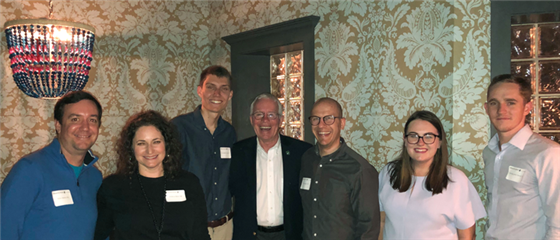

Didn’t See That Coming
Source/Author: Mike Murphy, Headmaster
May 03, 2019
During a recent visit with Shorecrest alumni in Washington, D.C., I met alumni who market for the federal government, work in the presidential archives in the White House, attend Georgetown and George Washington Universities, work in Department of Energy, coach teachers and administrators in charter schools for underserved students, promote partnerships for the National Football League Players Association, and research for Senator Rubio. Many are into their second career. Some are seeking new opportunities. Everyone seemed enthusiastic and optimistic.
I knew some of these alumni when they were at Shorecrest. They confirmed that they had never dreamed of doing their current job when they were in Upper School at Shorecrest. It is a fact that even as students today enter college with much more of a career focus than previous generations, most leave college and enter careers that are entirely different than what they planned when they were high school seniors. This is certainly not news. Technology, including artificial intelligence, is having and will continue to have a major impact on the development of new careers.
How do we educate children for jobs that do not already exist? The dark side of that question is what happens if a child is educated for jobs that no longer exist or are surviving as a novelty. It would be tough to hear, “Sorry son, we have all the stagecoach drivers we need.”
Schools today are more focused on habits of mind and skills students need than the content they study. Yes, there is a core body of knowledge people need to ensure they can function, serve and lead in a democratic republic that uses a capitalistic economic system. Knowing how to read, write, and do basic math certainly allows one to advance to more complex areas of learning. Knowing how to code, analyze complex materials, manage one’s physical and emotional health and solve problems creatively also matter. Knowing how to work in diverse groups, in a second language and within a timeline are skills today’s students should be learning.
We worry about the increasing levels of stress being experienced by tween and teens. Our D.C. alumni are not alone when they say they cannot imagine what it must be like to be in Middle School and Upper School with the barrage and uncertainty of what will be posted on social media. Any break we can give our children and ourselves from the addictive and often hostile messages found in social media is welcomed, whether we know it or not. Who would have thought that our cell phones and tablets could become so distracting and potentially harmful? Most of us did not see that coming.
What activities should children pursue to prepare them for the future? Anything that helps them know themselves and develop a sound foundation of core values is important. If young people know who they are and in what they believe, they will be prepared to face the unexpected challenges and changes that will surely come their way. I will add that having a solid relationship with a trusted adult, one who will let the young person develop independence, but at the same time be there to offer council and the support to stay on solid ground when people and circumstances rock one’s foundation has been and always will be important.
Putting energy into helping our children develop a solid foundation of values and learning skills may not protect our children from the uncertainty that will surely enter their lives. But they will provide the flexibility and coping skills needed to pivot from one experience to the next. One of the greatest charges for a college preparatory school is to support students as they develop independence so they can go out and create their own futures. Let’s do it.
Cheers!
Mike
























